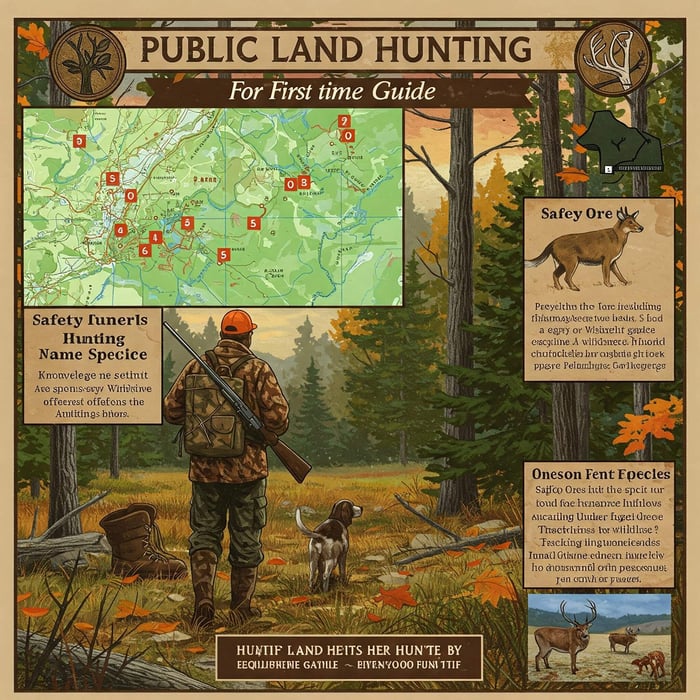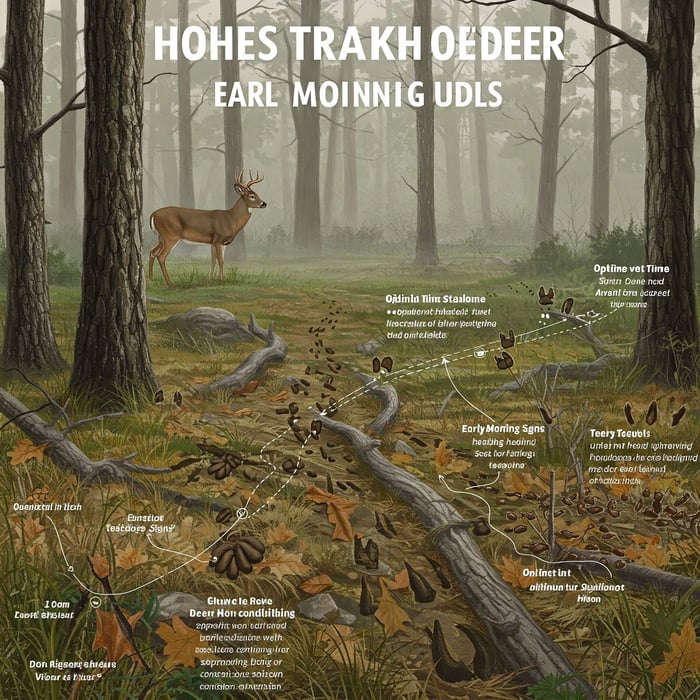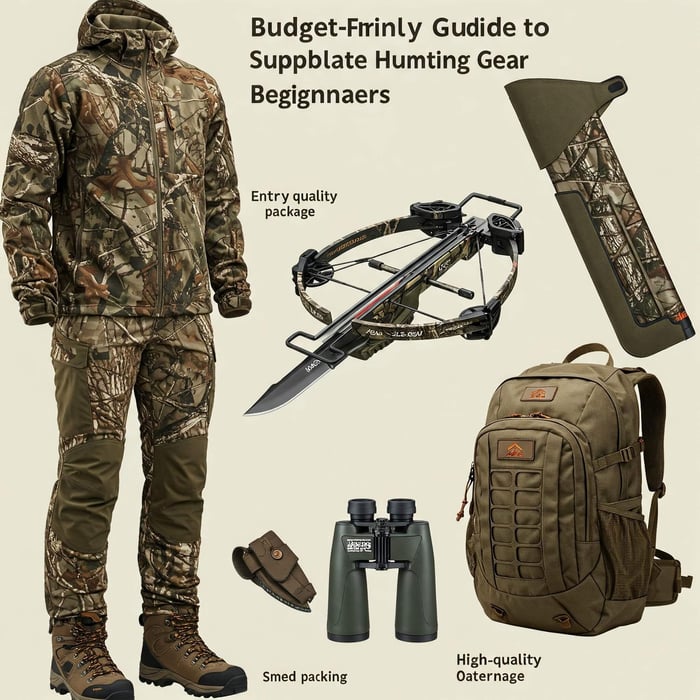Public land hunting is an exhilarating experience, particularly for new hunters. It's an opportunity to connect with the great outdoors, discover new skills, and perhaps score some game for dinner. But come on—getting started can be intimidating. Where do you hunt? What do you use? How do you keep yourself safe and stay out of trouble? Public land hunting tips for first-time hunters that's where this guidebook comes in. We're going in-depth into public land hunting advice for new hunters to get you started with confidence. This 6,000-word post is full of real-world advice, step-by-step instructions, and all you need to know to succeed on your first hunt.
Why Go With Public Land Hunting? Getting to Know the Basics
Public land hunting is a great choice for new hunters because it's open and frequently free or inexpensive. Public lands, such as national forests, state wildlife areas, or Bureau of Land Management (BLM) properties, are open to all. Public land hunting tips for first-time hunters means you don't have to own private property or purchase a pricey lease to hunt. But with that freedom comes a sense of responsibility. Let's take apart why public land hunting tips for beginning hunters are so critical and the way you could maximize these common spaces.
What Is So Special About Public Land Hunting?
Public land hunting tips for first-time hunters , hikers, campers, and other recreational users. This can make it more difficult to get close to game or get away from crowds, but that's also part of the allure. You're out there in the wilderness using your wits and your instincts. To be successful, you must plan and know the land. That's where public land hunting advice for beginner hunters is useful—they walk you through it so you're not walking around blind.
Public land hunting tips for first-time hunters nationwide. The National Forest Service operates approximately 193 million acres, and the BLM controls yet another 247 million acres. That's plenty of room to roam! All public land is not available to hunt, though, so consult local regulations first. This handbook will explain how to do both and more.
Public Land Hunting for Beginners - Tips for New Hunters
There's more to hunting on public land than appearing and expecting great things. Before you pick up your equipment and hit the ground, Public land hunting tips for first-time hunters let's get down to business. Here are some general public land hunting tips for beginner hunters to take you from here to there.
Step 1: Master the Rules and Regulations
Each state has different hunting regulations, and public property usually has its own rules too. For instance, some properties may ban a certain type of weapon or may allow hunting in only a specific season. Public land hunting tips for first-time hunters step one is to go to your state's wildlife agency website (such as Department of Natural Resources or Fish and Wildlife Service). Search for info on:
Hunting seasons for your desired game species (deer, turkey, elk, etc.)
License and permit requirements
Weapon restrictions (e.g., bow-only zones)
Specific rules for the public land you're going to hunt
Pro tip: Hunter education courses are available in many states and are sometimes mandatory for beginning hunters. These courses instruct you on safety, ethics, and regulations—important aspects of public land hunting advice for beginning hunters.
Step 2: Choose the Right Public Land
Not all public lands are created equal. Some are heavily trafficked, while others are remote and rugged. As a beginner, you’ll want to pick a spot that’s manageable. Here’s how to find the right one:
Use Online Tools: Websites like onX Hunt or HuntStand provide maps of public lands, showing boundaries, access points, and even game habitats. Public land hunting tips for first-time hunters these tools are lifesavers for first-time hunters.
Start Local: Look for public lands within a few hours of your home. This makes scouting and hunting trips easier.
Check Accessibility: Some public lands require long hikes or off-road vehicles to reach. Make sure you’re physically prepared and have the right equipment.
By choosing the right location, you’re setting yourself up for success. This is one of the most critical public land hunting tips for first-time hunters.
Step 3: Get the Proper Gear
You don't have to break the bank, but the right gear is a must. Here's a minimum checklist for new hunters:
Weapon: Select a firearm or bow that is legal in your region and appropriate for your target species. For instance, a.308 rifle is excellent for deer, and a compound bow is good for archery season.
Clothing: Wear blaze orange (mandatory in most states for safety) and dress in layers for unpredictable weather. Don't use scented detergents that might spook game.
Navigation Tools: Public land hunting tips for first-time hunters carry a GPS, compass, or map. Public lands are often huge, and it's easy to become lost.
Safety Gear: Carry a first-aid kit, flashlight, and multi-tool. A whistle can be useful if you need to signal for assistance.
Hunting License: Always carry your license and any required tags or permits.
Investing in quality gear makes a big difference. We’ll dive deeper into gear later, but for now, focus on the essentials. These are foundational public land hunting tips for first-time hunters.
Scouting and Preparation: Key Public Land Hunting Tips for First-Time Hunters
Scouting is one of the crucial steps involved in public land hunting. While on private land you may have access alone, on public land it is shared, and hence animals can be more elusive. Scouting facilitates you to get familiar with the land, find animal signs, and organize your hunt. Let's discuss how to scout properly with some public land hunting tips for beginners.
When and How to Scout
The optimal time to scout is several weeks prior to hunting season. This provides you with sufficient time to familiarize yourself with the area without spooking game too close to your hunt. Here's how to do it:
Visit the Land: Walk the area to identify trails, water sources, and bedding areas where animals may congregate.
Look for Signs: Search for tracks, droppings, rubs (on trees), or scrapes (on the ground). These are indicators that game is present.
Use Trail Cameras: If permitted, place a trail camera to watch for animal movement. This can save you time and provide you with useful information.
Scouting isn't merely about spotting animals—it's about knowing the land. Steep hills? Dense brush? Open fields? Knowing the topography is a key component of public land hunting advice for beginner hunters.
Reading Maps and Utilizing Technology
Maps are your best buddy when hunting public land. Paper maps from the U.S. Forest Service or BLM work well, but digital devices are better. Applications such as onX Hunt allow you to tag waypoints, navigate your location, and view property lines in real-time. This is particularly critical to prevent accidentally trespassing onto private property.
When interpreting maps, observe:
Funnels and Pinch Points: Areas where terrain forces animals to pass through, like narrow valleys or ridges.
Water Sources: Animals need water, so rivers, creeks, or ponds are prime spots.
Food Sources: Fields, oak trees (for acorns), or agricultural borders can attract game.
By combining old-school map-reading with modern tech, you’ll be well-prepared. This is one of the smartest public land hunting tips for first-time hunters.
Safety First: Public Land Hunting Tips for First-Time Hunters
Hunting is thrilling, but it’s not without risks. Public lands can be remote, and you’re sharing the space with other hunters. Safety is non-negotiable. Here are some must-know public land hunting tips for first-time hunters to stay safe.
Firearm and Bow Safety
Whether you’re using a rifle, shotgun, or bow, proper handling is critical. Follow these rules:
Always Keep the Muzzle Pointed in a Safe Direction: Never point at anything you don't plan to shoot.
Keep Your Finger Off the Trigger: Only put your finger on the trigger when you're about to fire.
Treat Every Gun as Loaded: Even if you believe it's unloaded, check again.
Know Your Target and Beyond: Ensure there's nothing (or no one) behind your target before firing.
For bow hunters, keep your arrows secure and your broadheads sheathed when not in use. These safety fundamentals are crucial public land hunting advice for new hunters.
Remaining Visible and Communicating
Public lands are congested, particularly during prime seasons. To prevent accidents:
Wear Blaze Orange: It's a requirement in most states for a good reason—it keeps you visible to other hunters.
Let Someone Know Your Plans: Inform a friend or family member where you are hunting and when you anticipate returning.
Carry a Communication Device: A cell phone may not function in remote country, so look at a satellite communicator such as a Garmin inReach.
Taking proactive measures to ensure safety allows you and others to have a good experience. These are important public land hunting tips for beginning hunters.
Strategies for Success: Public Land Hunting Tips for First-Time Hunters
With that in mind, let's discuss how to hunt. Hunting on public land takes strategy because animals are stressed by other hunters. Below are some tested public land hunting tips for first-time hunters to enhance your chances of success.
Timing Your Hunt
Timing is critical when hunting. Animals are the most active during dawn and dusk, so position yourself before daylight or in the late afternoon. Additionally, take into consideration the season:
Early Season: Animals are less stressed but might hold to heavy cover because of heat.
Late Season: Game may be trickier to locate, but the cold weather can cause them to be more active during the day.
Look at the weather, too. Rainy days or cloudy weather will get animals up and moving, while windy days may have them staying in their beds. Timing is an important aspect of public land hunting advice for new hunters.
Selecting a Hunting Technique
There are a variety of ways to hunt on public lands, and each has advantages and disadvantages. For a beginner, use these:
Still Hunting: Walk slowly through the woods, stopping frequently to observe and listen. This is effective in heavy cover.
Stand Hunting: Stand in a tree stand or ground blind along a trail or food source. This takes patience but can be effective.
Spot and Stalk: Spot game from afar, then stalk up to it carefully. This is more difficult for new hunters but thrilling.
Try various methods to discover what works best for you. Every method is in the public land hunting tips for first-time hunters arsenal.
Ethics and Respect: Public Land Hunting Tips for First-Time Hunters
Hunting is not only about taking game—it's about respecting wildlife, nature, and other individuals. Public land is a community resource, so ethics are essential. Below are some tips for first-time hunters to hunt responsibly on public land.
Leave No Trace
Public lands are for everyone, so keep them tidy. Observe these principles:
Pack Out What You Pack In: Remove all trash, such as food wrappers, shells, and equipment.
Minimize Impact: Stay on established trails to prevent damaging plants.
Respect Wildlife: Take only shots you feel comfortable with to prevent injuring animals.
Leaving the land in better condition than you entered is a central part of first-time hunter public land hunting tips.
Respect Other Hunters
You are not alone. To prevent disagreements:
Give Space: If you notice another hunter's stand or vehicle, move to a new location.
Be Respectful: A kind wave or silent nod is worth a thousand words.
Follow Local Customs: Certain regions have unspoken norms, such as avoiding too much hunting near access points.
Being respectful is doing your part in making a positive hunting environment. These are crucial first-time hunter public land hunting tips.
Gear Deep Dive: First-Time Hunter Public Land Hunting Tips
Earlier, we mentioned basic gear, but let's dive deeper. The proper equipment can make or break your hunt. Here's an in-depth look at what you'll need, specific to public land hunting tips for new hunters.
Weapons and Ammunition
Your weapon selection is based on your target species and local laws. Here's a quick rundown:
Rifles:.243,.270, or.308 are handy for deer and small game. Ensure it's properly sighted in.
Shotguns: Excellent for turkey or small game. Utilize the correct choke and shot size (e.g., #4 for turkey).
Bows: Compound bows are easy to start with. Shoot at various ranges to practice.
Always have sufficient ammo or arrows, but don't overpack. Public land hunting tips for first-time hunters quality is important, so spend money on good gear. This is an important aspect of public land hunting advice for beginners.
Clothing and Camouflage
Public land hunting frequently involves long days in uncertain weather. Public land hunting tips for first-time hunters here's what to wear:
Base Layers: Moisture-wicking fabrics keep you dry.
Insulation: Fleece or wool layers provide warmth without bulk.
Outer Layer: Keep rain and wind out with waterproof, breathable pants and jacket.
Camouflage: Select a color pattern that matches your terrain (e.g., forest for wooded areas, open country for sage).
Don't forget durable, well-trucked boots—public lands can get tough. Having the right gear is essential to public land hunting tips for beginner hunters.
Troubleshooting Common Challenges: Public Land Hunting Tips for First-Time Hunters
Public land hunting has its own set of challenges, particularly for new hunters. Let's talk about some common problems and how to overcome them with public land hunting advice for new hunters.
Coping with Crowds
Busy public lands are common, particularly on opening day. To steer clear of crowds:
Hunt Weekdays: Weekends are more crowded, so if you can, take a day off work.
Go Deeper: Stick close to access points. Hike deeper in for less pressure.
Try Less Popular Areas: Use smaller or lesser-known public lands for a more peaceful experience.
Seeking solitude requires effort, but it's worth it. This is one of the most practical first-time hunter tips for public land hunting.
Dealing with Harsh Terrain
Public lands can be harsh, with steep slopes, dense woods, or wetlands. Prepare by:
Training Physically: Hike or do cardio exercise prior to your hunt to build up endurance.
Packing Light: Pack light to avoid getting tired.
Using Trekking Poles: They assist in balance and lower strain on extended hikes.
Being prepared for terrain enhances your hunting experience. These are essential first-time hunter public land hunting tips.
Post-Hunt Tips: First-Time Hunter Public Land Hunting Tips
Your search doesn't end when you depart the field. Good post-hunt practices keep you prepared for next time and show respect for the land. Below are some last public land hunting tips for beginners.
Processing Game
When you harvest an animal, you'll need to field dress and process it. Here's a brief guide:
Field Dressing: Take out the internal organs to cool the meat fast. Wear gloves to remain clean.
Transporting: Transport meat in game bags to maintain cleanliness and cooling.
Processing: Butcher the animal yourself or have it done by a professional processor.
Learning to process game is fulfilling and part of the hunting experience. This is a valuable aspect of public land hunting tips for beginner hunters.
Reflect and Improve
Take time to reflect after your hunt:
What Worked?: Did your scouting pay off? Was your gear comfortable?
What Didn't?: Did you become lost? Were you not dressed for the weather?
Plan for Next Time: Take what you've learned and use it to make your next hunt better.
Ongoing learning is what defines excellent hunters. These are the last public land hunting tips for beginner hunters.
Conclusion
Public land hunting is an adventure, and as a first-time hunter, you have only just begun. By following these public land hunting tips for first-time hunters, you’ll be prepared, safe, and ready to enjoy the experience. From researching regulations to scouting, choosing gear, and hunting ethically, every step builds your skills and confidence. Public land hunting is about more than harvesting game—it’s about connecting with nature and challenging yourself. So grab your gear, hit the woods, and start your adventure. Happy hunting!





